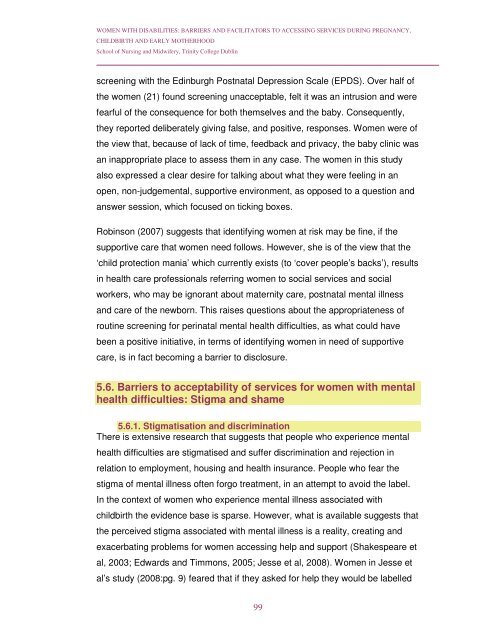Women with Disabilities: Barriers and Facilitators to Accessing ...
Women with Disabilities: Barriers and Facilitators to Accessing ...
Women with Disabilities: Barriers and Facilitators to Accessing ...
You also want an ePaper? Increase the reach of your titles
YUMPU automatically turns print PDFs into web optimized ePapers that Google loves.
WOMEN WITH DISABILITIES: BARRIERS AND FACILITATORS TO ACCESSING SERVICES DURING PREGNANCY,CHILDBIRTH AND EARLY MOTHERHOODSchool of Nursing <strong>and</strong> Midwifery, Trinity College Dublinscreening <strong>with</strong> the Edinburgh Postnatal Depression Scale (EPDS). Over half ofthe women (21) found screening unacceptable, felt it was an intrusion <strong>and</strong> werefearful of the consequence for both themselves <strong>and</strong> the baby. Consequently,they reported deliberately giving false, <strong>and</strong> positive, responses. <strong>Women</strong> were ofthe view that, because of lack of time, feedback <strong>and</strong> privacy, the baby clinic wasan inappropriate place <strong>to</strong> assess them in any case. The women in this studyalso expressed a clear desire for talking about what they were feeling in anopen, non-judgemental, supportive environment, as opposed <strong>to</strong> a question <strong>and</strong>answer session, which focused on ticking boxes.Robinson (2007) suggests that identifying women at risk may be fine, if thesupportive care that women need follows. However, she is of the view that the‘child protection mania’ which currently exists (<strong>to</strong> ‘cover people’s backs’), resultsin health care professionals referring women <strong>to</strong> social services <strong>and</strong> socialworkers, who may be ignorant about maternity care, postnatal mental illness<strong>and</strong> care of the newborn. This raises questions about the appropriateness ofroutine screening for perinatal mental health difficulties, as what could havebeen a positive initiative, in terms of identifying women in need of supportivecare, is in fact becoming a barrier <strong>to</strong> disclosure.5.6. <strong>Barriers</strong> <strong>to</strong> acceptability of services for women <strong>with</strong> mentalhealth difficulties: Stigma <strong>and</strong> shame5.6.1. Stigmatisation <strong>and</strong> discriminationThere is extensive research that suggests that people who experience mentalhealth difficulties are stigmatised <strong>and</strong> suffer discrimination <strong>and</strong> rejection inrelation <strong>to</strong> employment, housing <strong>and</strong> health insurance. People who fear thestigma of mental illness often forgo treatment, in an attempt <strong>to</strong> avoid the label.In the context of women who experience mental illness associated <strong>with</strong>childbirth the evidence base is sparse. However, what is available suggests thatthe perceived stigma associated <strong>with</strong> mental illness is a reality, creating <strong>and</strong>exacerbating problems for women accessing help <strong>and</strong> support (Shakespeare etal, 2003; Edwards <strong>and</strong> Timmons, 2005; Jesse et al, 2008). <strong>Women</strong> in Jesse etal’s study (2008:pg. 9) feared that if they asked for help they would be labelled99
















